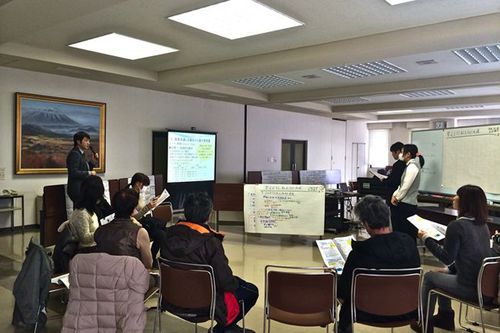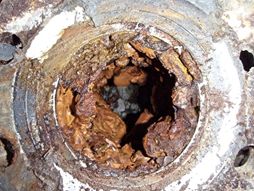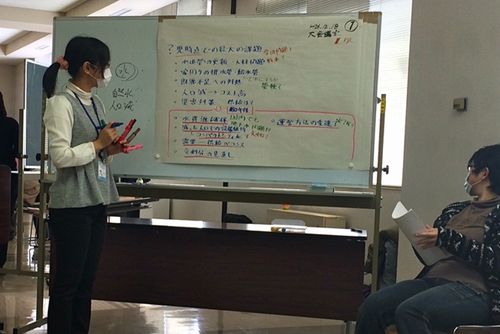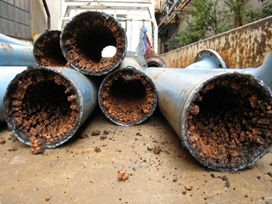August 19, 2015
Yahaba Waterworks Supporters Workshop -- Citizens Decide on the Future of the Water Supply
Keywords: Newsletter Water
JFS Newsletter No.155 (July 2015)

Copyright Junji Hashimoto All rights reserved.
At a symposium on local governance and the water supply in November 2014, I heard Water and Sewerage Section Chief, Ritsuji Yoshioka, of Yahaba, a town in Iwate Prefecture, describe an interesting initiative. He said, "Citizens' understanding is essential to implementing water supply policies, but in reality they are less and less interested in the water supply. Most citizens have had tap water all their lives, so they take it for granted. For them, it is natural to get water by just turning on a faucet. Those who are interested in the water supply have two main concerns: tastier tap water and cheaper water rates."
Water supply management has become more and more difficult due to a declining recipient population, necessary waterworks renovations and other factors. Countermeasure implementation, however, varies depending on the local government. Regarding waterworks crisis awareness, many water suppliers are still at a stage where they vaguely recognize the danger ahead. Only a few have estimated their future figures in detail.
As to democratization of waterworks, most municipalities do not share -- or they just think they share -- their thoughts and plans with their citizens. When water suppliers say they have shared information with citizens, it often turns out they have uploaded just a few pages of documents onto their websites. In short, they are merely posting information, not sharing it.
Aware of such problems, Yahaba worked out a two-step PR strategy. The first step has been to publish a cartoon booklet to inform the town of the current water supply situation. For a government-produced document, it is quite trendy. The second has been to hold workshops in which the citizens participate as "Waterworks Supporters." The participants, consisting of citizens selected from among applicants, join study sessions together with town officials, where they learn about the current situation and water supply issues. As a result, the town has received comments from the participants such as, "It is necessary to raise water rates to ensure a secure water supply."
What caused their thoughts to change from asking for tastier tap water and cheaper water rates to accepting an increase in water rates to keep their water supply secure? Seeking an answer, I visited the town and joined the workshop.
In a meeting room on the fourth floor of the Yahaba town hall, about 20 Yahaba Waterworks Supporters had gathered. They split up into two groups of about 10 people, and sat in chairs arranged in a U-shape in front of a whiteboard.
Each group had a facilitator and record keeper who wrote down the participants' comments on large pieces of papers and posted them on the whiteboard. They used one sheet of paper for each question to write down their comments. There were other sheets of papers posted on which participants' comments from the first study meeting had been written. Looking at these, I could see they were seriously committed to sharing information and reaching an agreement with the residents.
First, the facilitators asked the participants a question, "Do you think current priorities among waterworks issues will change in 30 or 50 years?"
To answer this question, the members needed not only a good understanding of the current issues, but also a wide range of knowledge for predicting issues 30 or 50 years from now.
I worried whether they could handle this without getting stuck. My concern, however, proved pointless. They spoke frankly with no hesitation, with one after another bringing up current issues, including

Decrepit water pipeline
Copyright Junji Hashimoto All rights reserved.
- decrepit water pipelines
- a staffing shortage in waterworks
- a financial shortage due to a declining population receiving water
- disaster countermeasures
- and other concerns.
When asked if they thought waterworks issues priorities would change in 30 or 50 years, they replied,
"Priorities will change according to how current issues are ascertained and countermeasures are implemented," and, "It is important not to pass the burden on to future generations, our generation must also pay the costs."
From the beginning, I was deeply impressed with the great insights of the Yahaba Waterworks Supporters.

A facilitator writing down participants' comments
Copyright Junji Hashimoto All rights reserved.
The Yahaba Waterworks Supporters was established to reflect the voices of the citizens, who are generally less conscious of waterworks. The supporters' system, however, does not exist in isolation. It takes a multi-layered approach to sampling the citizens' opinions on waterworks, through public comments, outreach and the Yahaba Waterworks Supporters.
- Public comments ensure citizen participation in water supply operations.
- Outreach is conducted by waterworks staff, who interview citizens and write down their opinions on cards.
Interviews on waterworks have been conducted at a shopping center and other public spaces. A total of 954 people out of 1000 citizens cooperated without hesitation. "It is not that they have little interest in waterworks, but rather, they do not direct their attention to it," said Yoshioka. The citizens' opinions were found to be:
- Water supply rates are expensive.
- Tap water smells like chlorine.
- I usually drink ionized water from the supermarket.
- Tap water tastes bad.
The citizens' major interests were water rates and the quality of tap water. The waterworks operators wanted people to know how hard it was to manage a large volume of water through pipelines or at water purification facilities. The interviews revealed a large gap between the operators and citizens.
Moreover, the Yahaba Waterworks Supporters, who are paid volunteers selected from among applicants, learn about the waterworks regularly, thinking about the future of the Yahaba waterworks.
Seven people applied the first year, fiscal 2008. The town held a monthly workshop and tried to discuss water supply operation issues. The participants wrote down their opinions on paper, one by one. The opinions were categorized into small groups, then into medium-sized groups, and then into large groups.
Among the 11 participants in fiscal 2009, one person had a prior interest in waterworks. Most were amateurs. They learned about waterworks while talking and enjoying sweets. They watched videos, tasted tap water and mineral water for comparison, and conducted a site visit to the water purification facility.
Since then, supporters have been selected from among applicants each year. It is not a place for individual learning, but has become a learning organization. New members have been added every year, and they deepen their understanding year by year.
In the postwar years of rapid economic growth, municipal governments all over Japan established waterworks. These have all aged and entered their renewal period at the same time. There have been cases in Japan of local citizens having to bear part of the costs for maintaining the waterworks. The Yahaba Waterworks Supporters have sought a way to manage their town's waterworks project and its desirable future form sustainably.
Over time, the supporters have developed their knowledge, and their awareness of waterworks has changed:
- I used to take waterworks for granted, but I have learned a lot of things in the supporter program including the basis of water supply rates.
- I have come to know how hard it is for people engaged in waterworks. I'll use tap water more consciously from now on.
- To maintain water supply operations, adequate investment is necessary, and for that purpose, raising water rates is unavoidable.
Waterworks supporters have also been engaged in drafting a waterworks vision, depicting ideal water supply operations. They draw cartoons to help promote this vision. The cartoons are delivered to each household with the water bill, and made available at convenience stores in the town for free.
Cartoons featuring Yahaba's waterworks
http://suidou.town.yahaba.iwate.jp/archives/manga/manga (in Japanese only)
Yahaba's politics is characterized by a struggle to reflect the views of the silent majority. How do we hear the voice of the silent majority? It is a challenge not only for municipal policy-makers, but also for those of the national government. Seeking public comments, conducting interviews and building learning organizations could also serve their needs in many ways.
I was impressed that the discussion at the Yahaba Waterworks Supporters Workshop was based on decent preliminary data. The premises of the discussion included previously shared information on population decrease, changes in water demand, facility performance and the maintenance status of reservoirs.
Based on these premises, the participants examined approaches to facility maintenance from a mid-term viewpoint of about 40 years. Water supply accounting balances were divided into the routine business of supplying tap water (revenue income and expenses) and purification plant operation and pipeline maintenance business (capital income and expenses). In the case of Yahaba, the revenue income and expenses were in the black, paying for facility costs with accumulation of an internal reserve. The town had no debts (corporate debts) and maintained an extremely sound financial status.
Many water supply operators tend to run in the red with revenue income and expenses due, for instance, to the declining recipient population. The operators borrow money to build facilities, so they face serious financial difficulties. During the past few years, some operators have suddenly announced water bill price hikes with no explanation.
In fact, Yahaba's waterworks is very sound financially, but there are two major issues from mid- and long-term viewpoints. One is the difficulty of continuing a positive revenue income and expense balance as the population decreases, and the other is an increasing capital expense balance due to aging water pipes that need to be updated. In short, it is a situation where income is decreasing and expenses increasing.

Updating water pipelines
Copyright Junji Hashimoto All rights reserved
Therefore, first, they need to estimate how old the facility and water pipelines are. Water pipelines will need to be updated one after another. If updates are postponed until the last minute, the burden on the next generation will be increased, because even if the cost of updating remains the same, the cost per person will be larger as the population decreases.
Considering the situation, the participants at the Yahaba Waterworks Supporters meeting said, "Some price hikes in water bills will be inevitable," and "It is like setting money aside for a refrigerator replacement." They think of it as an insurance-like investment to reduce the burden on the next generation. This opinion is being reflected in the town's water supply business.
In Yahaba, citizens gain a thorough understanding of the status of water supply operations, assess the situation using concrete data from mid- and long-term viewpoints and make future-oriented decisions.
One reason Yahaba has succeeded in creating rapport with the citizens is, of course, that the town's water supply is in the black thanks to their management efforts. Regardless of whether the business is in the black or in the red, however, it is essential for all water supply operators to disclose their financial situation to the citizens.
People may be surprised or upset if they learn that the waterworks of the town they live is having serious trouble.
What a person can do then is either run away or accept responsibility. If we don't want to move, we need to get involved, think logically about what to do and make decent decisions.
Junji Hashimoto, water journalist
Related
"JFS Newsletter"
- 'Good Companies in Japan' (Article No.4): 'Eightfold Satisfaction' Management for Everyone's Happiness
- "Nai-Mono-Wa-Nai": Ama Town's Concept of Sufficiency and Message to the World
- 'Yumekaze' Wind Turbine Project Connects Metro Consumers and Regional Producers: Seikatsu Club Consumers' Co-operative
- Shaping Japan's Energy toward 2050 Participating in the Round Table for Studying Energy Situations
- 'Good Companies in Japan' (Article No.3): Seeking Ways to Develop Societal Contribution along with Core Businesses


